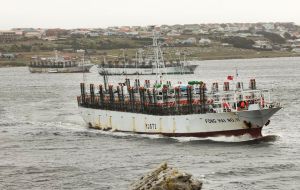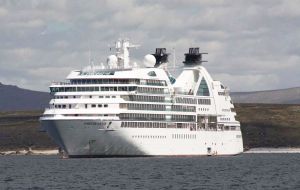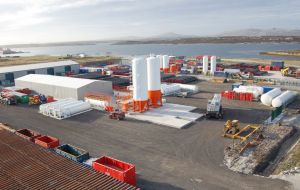MercoPress. South Atlantic News Agency
Falklands faces fiscal 2015/16 with surplus budget, all industries prospering and 1.4% inflation
 Ms Granger points out however that “the economy is not without challenges: falling oil prices and reliance on a few core industries and commodities”
Ms Granger points out however that “the economy is not without challenges: falling oil prices and reliance on a few core industries and commodities”  Fishing remains the largest of traditional industries and this year has seen another bumper Illex season: 350,000 tons caught this year.(Pic N. Bonner)
Fishing remains the largest of traditional industries and this year has seen another bumper Illex season: 350,000 tons caught this year.(Pic N. Bonner)  The meat industry impacted by the global market and a favorable warm wet summer has led to 50,000 sheep and lambs being processed for the export season
The meat industry impacted by the global market and a favorable warm wet summer has led to 50,000 sheep and lambs being processed for the export season  Cruise numbers increased with overnight visitors and domestic tourism spend both increasing, resulting in an overall increase in the industry spend. (Pic A. Henry)
Cruise numbers increased with overnight visitors and domestic tourism spend both increasing, resulting in an overall increase in the industry spend. (Pic A. Henry)  Recent years have seen an increasing element of GDP being driven by the oil and gas sector with 25% of GDP in 2012 relating to this industry
Recent years have seen an increasing element of GDP being driven by the oil and gas sector with 25% of GDP in 2012 relating to this industry The Falkland Islands Legislative Assembly received on Tuesday the Appropriation Bill which allows for expenditure of £61.4M pounds in the fiscal year 2015/16, supported by revenues of £56.9M and a projected £4.9M from oil and gas exploration, thus completing another surplus year.
The presentation of the bill by Financial Secretary Nicola Granger included a summary of the Falklands' economy situation and prospects, indicating that all main industries (fisheries, tourism, agriculture and oil and gas) are healthy and prospering with sufficient financial surplus as to ensure 2.5 times department spends with non committed funds, and 1.4% inflation.
Ms Granger also detailed a budget strategy of nine points, outlined in late 2014, and which basically targets keeping the Falklands' expenditure in line with available means; no debt for operating purposes; sufficient reserves to face economic volatility; efficient and effective public services but with an emphasis in recovering costs; improving quality of life, pensions and minimum wage (£5.38 and £3.30 for young person); helping promote small businesses and trades and infrastructure investment.
However the Financial Secretary points out that the Falklands' economy “is not without its challenges, falling oil prices, and reliance on a few core industries and commodities continue to provide the Islands with challenges to address”.
In reference to the good years and particularly the oil and gas industry, Ms Granger said that the Medium Term Financial Plan “uses windfalls received over recent years to further invest in the Islands whilst not placing reliance on future revenues to support the operating budget until such time as they have been received”.
Follows the speech to the elected Legislative Assembly:
The purpose of the Bill before you today is to authorize the appropriation of monies from the Consolidated Fund for the next financial year. Before discussing the provisions of the Bill I will provide an update on the state of the Falklands economy.
In general, the Falklands economy is strong. Fishing remains the largest of the traditional industries and this year has seen another bumper Illex season with the previous record catch being surpassed by the 350,000 tons caught this year.
However, some caution is needed as Illex have spread to areas where they are not usually seen in such abundance and have overlapped into the Falkland Calamari area which may have disrupted this stock impacting on the next year. Falkland Calamari catches this year have been reasonable although slightly below average at 40,000 tons. Last year’s difficulties for Rockcod have not reoccurred and catches returned to normal levels with 56,000 tons taken this year.
Agriculture remains the second largest of the traditional industries accounting for 2% of GDP whilst employing 10% of the workforce, the largest proportion of the workforce outside the public sector. Wool production has been declining over the past 15 years though a rise in the international wool market this year has provided good wool returns to farmers. The meat industry continues to be impacted by the global market though a favorable warm wet summer has led to 50,000 sheep and lambs being processed for the export season following a change in strategy by FIMCo on new season lambs.
In tourism, cruise numbers increased in 2014 with overnight visitors and domestic tourism spend both increasing, resulting in an overall increase in tourism spend. Forecasts for 2015 are positive, driven by reducing oil prices and the dollar: sterling exchange rate encouraging more tourism from the US, whilst potentially impacting negatively on tourism from the Euro-zone. Draft tourism satellite accounts show value added from the tourism industry of £3M, accounting for 1.5% of GDP.
Recent years have seen an increasing element of GDP being driven by the oil and gas sector with 25% of GDP in 2012 relating to this industry. Oil and gas exploration has added value to the economy, as well as FIG revenues, in recent years, and as ever we hope this will continue.
That being said, the economy is not without its challenges, falling oil prices, and reliance on a few core industries and commodities continue to provide the Islands with challenges to address.
Turning to the public finances, as anticipated at this time last year the 2014/15 financial year was positive with higher revenues from Illex, increased economic
activity driven by the oil and gas industry and a favorable investment market. These higher revenues enabled a further capital investment of £15M and measures to encourage further economic development totaling £5.2M whilst also increasing unrestricted reserves by £9M. The financial position has been further bolstered this financial year by another good Illex season.
The Budget Strategy was re-affirmed by ExCo in October 2014 based around nine principles. Principle 1 is to spend within FIG’s means. Budget Select Committee feels that, in the medium term, deficit budgets should not be considered without good reason, are sustainable and spending remains within FIG’s means. The higher reserves available therefore enables me to present a sustainable Budget to the Assembly today using reserves of £2.5M in year one and in the medium term £5.1M to support the operating budget. It is important to note that this spending is projected from reserves already held and projections for recurring revenues over this time.
This leads onto principle 2 that there will be no debt for operating purposes. The Falkland Islands is fortunate in that we have no national debt. The budget proposed continues with this principle and does not require any public sector borrowing for operating purposes. Whilst outside the principle, the budget also does not require any borrowing for capital purposes.
Principle 3 is that a reasonable level of funds are held in uncommitted reserves, judged by ExCo and Budget Select Committee to be maintaining 2.5 times departmental spend. Higher reserves enable the investments proposed today to be made, whilst ensuring a sustainable future by maintaining a buffer against the volatility present in our economy. The budget proposed today maintains reserves at, this level, for the term of the Medium Term Financial Plan.
The Budget Select Committee also reviewed revenue projections for the next five years to ensure that these are appropriate. These three principles provided the context within which the Budget Select Committee reviewed funding requests and allocated £33.3M additional funds as follows; £6.4M to public services, £700,000 to pension funds, £3.5M to improve the quality of life, £3.1M to economic development and £19.6M investment into strengthening infrastructure.
Principle 4 is to provide an appropriate level of funding to maintain efficient and effective public services. Additional investment above the level of inflation was felt appropriate, in particular to allow additional funding over the next 5 years for Health of £2.5M, Education of £2.5M and £1M relating to public diplomacy.
FIG’s policy relating to service provision continues to be to seek to recover the cost from the user of the service where appropriate. Annual inflation, or RPI, currently stands at 1.4%. To ensure that the revenue recovered on services continues to be in line with the cost of provision, an inflationary increase of 1.5% will be applied to the following fees and charges; dental charges, stamps, training centre fees, agricultural and veterinary fees, registry fees, immigration fees, harbor dues and customs clearance fees, police vetting and licence fees (excluding the vehicle licence).
There are a number of areas where cost recovery is not currently being achieved. Medical charges to non-entitled patients have long been considered to be below cost recovery. The Director of Health and Social Services is undertaking an exercise to assess the cost of delivering medical services however at this time an increase of 50% in non-entitled charges will be implemented to bring the services towards cost recovery. Likewise, the cost of running Stanley House is not being recovered and therefore a 10% increase in accommodation charges is included. This will increase the full board charge for resident children by £24 pounds a term. Other increases above inflation are the banking licence which will increase to £7,000 from 1st January 2016. Septic tank cleaning will increase by 5% to ensure cost recovery, aggregate rates by 7.5%, civil aviation charges by 3% and legal services fees have been reviewed and adjusted accordingly. The tourist industry has asked for advance notice of passenger levies and from the 2016/17 season these will be increased by 5% to £21 for Stanley and £7.50 for Camp visits.
The environmental planning department have previously not recovered the cost of service provision. Budget Select Committee therefore approved the creation of a fee structure for environmental and planning applications. These fees are based around the amount of work required in the process in order to move towards cost recovery, for example the fee for a full planning application relating to the construction of residential accommodation will be £48.
The intention remains to introduce a Commercial Service Charge but Budget Select Committee asked for further work to be undertaken to identify a fee structure that is considered equitable. Court fees are currently being reviewed and it is anticipated that these will be announced in the upcoming months.
Some fees are already considered to be recovering the cost of service provision and therefore have not been increased, including: landing fees, electricity connection charge, funerals, cemetery plot reservations, commercial water and waste charges.
The most significant area to provide revenue for general support of the operating budget are taxes. Budget Select Committee have not proposed any changes to tax bands or rates, including corporation, personal and medical services tax.
Principle 5 ensures that appropriate funding is in place for Special Funds, the Currency Fund and the Insurance Fund. The Insurance Fund will be restructured slightly to allow death-in-service premiums to be paid directly from this Fund to the Pension Fund.
Principle 6 is to ensure that sustainable arrangements are in place for pensions. In recent years a number of transfers have been made into pension funds to seek to reduce the deficits. The Pension (Old Scheme) Fund is now anticipated to be reaching full funding though an actuarial review will be taking place over the next six months to re-assess this. The actuary’s recommendations on the Retirement Pension Fund, the state pension, were accepted in 2012 and the Budget Select Committee re-affirmed these, agreed to an inflationary increase in the resident rate of 50p a week and also increased the subsidy to address the difference between the actuarial and resident contribution rate. Whilst talking of pensions, the House will be aware that a public consultation was undertaken late last year relating to the structure of the retirement pension contribution. The remit for this review was to highlight whether the state pension should move to a salary based contribution. The overwhelming response was that it should not, with 69% of respondents preferring the current system that links the pension received proportionally to the contributions paid. ExCo therefore agreed to maintain the current model of flat rate contributions. The original objective was to assist the Islands Plan priority relating to those earning low incomes and therefore ExCo accepted some subsidiary recommendations in this area. Firstly, they agreed that consideration be given to making it compulsory for employers to make occupational pension contributions (in addition to the state pension contribution) as part of the upcoming employment law policy review. Secondly a number of changes to the Retirement Pensions Ordinance were agreed; to remove the requirement to pay in excess of 2,200 contributions, increase the earnings threshold to match the Minimum Wage (based on a 40 hour week) and to remove the interest penalty when people pay voluntary contributions. Finally, to extend the existing Contribution Credit scheme to cover those in self-employment who are effectively earning below the minimum wage and those in receipt of welfare benefit. Over the next few months an information campaign will be run on saving for retirement and an amnesty period started to encourage individuals to work with the pensions team on their retirement plans.
Principle 7 is to seek to improve quality of life and this year there are a number of provisions that are aimed to do so within the community. Firstly, 1.5% increases to welfare, attendance and fostering allowances and an increase to child allowance to £68 per month. Pensions, including the retirement pension, will increase by 4%, with Christmas bonus continuing to be paid to resident pensioners, and a 2% cost of living increase awarded to the Civil Service. The incremental pay system for eligible FIG employees will also be un-frozen from the 1st July this year enabling individuals to progress within their grade with experience. Other fees, such as electricity, domestic service charge, vehicle licence fee, FIGAS fares and the embarkation fee, and allowances such as the winter fuel allowance, have been maintained at current levels thereby mitigating the increase to the cost of living. Rental charges for FIG properties will only increase by 1% which is less than the rate of inflation. The working and childcare credit schemes will continue as currently approved, enabling lower income working parents to access support for childcare.
The Minimum Wage has been reviewed and Exco agreed for it to be set at 75% of the Living Wage. From the 1st January 2016 the Minimum Wage will therefore increase to £5.38 and £3.30 for young persons. I am pleased to confirm that all FIG staff (including apprentices) will earn at least the Living Wage of £7.18 from 1st July.
Principle 8 to encourage economic development has firstly been achieved through the additional £3.1M direct spending. In addition to this, Budget Select Committee agreed to extend depreciation allowances for the purposes of taxation of businesses to cover some improvements to land, specifically car parks, hard standings and roads. The last of these requires some further definition so is not included in the Finance Bill today, work on this will be undertaken prior to the start of the tax year. In a similar area, from the 2016 tax year capital allowances will be available to self-employed businesses to apply against MST.
Three expressions of interest were received under the Roads to Non-Agricultural Destinations policy and Budget Select Committee referred these to FIDC to undertake further work with the applicants. Standing Finance Committee recently reviewed FIG’s investment strategy and agreed to provide additional support for local investments of up to £10M to be managed through the FIDC Loans policy.
The largest element of additional investment was directed towards Principle 9 to strengthen infrastructure within the Islands. This additional investment of £19.6M will be partially funded by the additional transfer to the Capital Equalization Fund discussed earlier.
In summary, the Appropriation Bill before the House today allows for expenditure in 2015/16 of £61.4M pounds; £47.3M to run the public services, £10.5M investment in Island Plan priorities, £600,000 social investments to the pension funds and £3M relating to oil and gas development projects. This is supported by recurring revenues of £56.9M and a projected £4.9M from oil and gas exploration. The Medium Term Financial Plan therefore uses windfalls received over recent years to further invest in the Islands whilst not placing reliance on future revenues to support the operating budget until such time as they have been received.
I would like to thank everyone who has had involvement in the budget this year in particular Daniel, Lydia and Margaret who have spent many hours on reviewing budgets, report writing and minutes.
Mr. Speaker, Honorable Members, this concludes my presentation of the Appropriation Bill to this House and I beg to move that the Bill be read a second time.
Nicola Granger, Financial Secretary, 2nd June 2015.




Top Comments
Disclaimer & comment rules-

-

-

Read all commentsOh no, the Argentines are not going to like this news as it makes them look like monkeys when it comes to managing their own national finances... which they are of course.
Jun 03rd, 2015 - 09:47 am 0It's nice to maintain a surplus each year. Chile’s government is required (and does) to deposit an amount equivalent to between 0.2 and 0.5 percent of the previous year’s GDP into a pension reserve fund. It is also required to put a percentage of its fiscal surplus into its so-called Economic and Social Stabilization Fund. The size of the latter fund has increased from $2.6 billion at its inception in 2007 to $14.7 billion in December 2014.
Every year is another FU to Argentina.
Jun 03rd, 2015 - 10:02 am 0Pretty awesome isn't it.
#2 Skip
Jun 03rd, 2015 - 10:19 am 0Success is the greatest revenge...
Commenting for this story is now closed.
If you have a Facebook account, become a fan and comment on our Facebook Page!